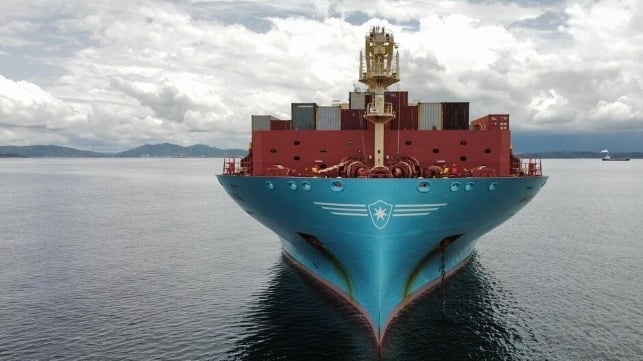Maersk Line Ltd Ordered to Rehire Chief Mate Who Tipped Off Coast Guard

The U.S. Occupational Safety and Health Administration (OSHA) has ordered Maersk's American division to pay an officer more than $700,000 after it dismissed him for telling the U.S. Coast Guard about alleged deficiencies aboard the boxship Maersk Tennessee (ex name Safmarine Mafadi).
On December 29, 2020, after a disagreement with his captain about alleged drinking on board, the chief mate aboard the Safmarine Mafadi reported a list of concerns about the ship's condition to the Coast Guard. According to the chief mate, the ship's lifeboat block and releasing gear were inoperable, crew members were drinking or in possession of alcohol on the ship, the emergency fire pump was broken, trainees were standing watch unsupervised, and the cargo hold bilge system was causing flooding.
A Coast Guard inspection team came aboard at 1745 hours the same day to look at the ship. The inspectors made note of a leak in the fire main in the starboard tunnel, a cracked safety rail, and lifeboat blocks in need of replacement.
As soon as the inspection was over, the captain suspended the chief mate and ordered him off the ship, according to OSHA. The mate was fired three months later for reporting problems to the Coast Guard "without discussing the issue(s) with the Ship Superintendent, Fleet Group, and the Marine Standards team," in violation of written company policy.
OSHA ruled that Maersk Line Limited's policy and its decision to fire the chief mate both violated the U.S. Seaman's Protection Act. The act allows merchant mariners to report problems aboard a U.S.-flagged vessel to the U.S. Coast Guard, without first going up the chain of command within their company - even if the company says that this is prohibited.
"Federal law protects a seaman's right to report safety concerns to federal regulatory agencies, a fact every maritime industry employer and vessel owner must know," said OSHA Regional Administrator Eric S. Harbin. "Failure to recognize these rights can instill a culture of intimidation that could lead to disastrous or deadly consequences."
OSHA determined that if the mate had not complained to the Coast Guard, he probably would have been promoted to master, based on his performance evaluations and related correspondence. It characterized his dismissal as an "illegal action" which had caused the mate "extreme hardship, financial stress, and suffering."
In its response, Maersk Line Limited argued that the ISM Code requires crewmembers to report issues up the chain of command, and it asserted that the mate had made the report in bad faith. It noted that the Coast Guard had cleared the ship to sail after the inspection.
OSHA has ordered Maersk Line Limited to reinstate the chief mate, promote him to the rank of master, and pay him about $460,000 in back pay, interest and compensatory damages, plus attorney's fees. The agency added the maximum possible punitive damages award ($250,000) to counteract what it described as the "chilling effect already present from Respondent’s illegal policy," and it ordered MLL to revise its internal rules for reporting.

that matters most
Get the latest maritime news delivered to your inbox daily.
Maersk Line Limited has the option to appeal OSHA's decision to an administrative law judge.
"The U.S. Coast Guard is committed to partnering with OSHA in protecting whistleblowers and to vigorously enforce the Seaman's Protection Act. We encourage everyone within the maritime domain to support and abide by these protections," said Assistant Commandant for Prevention Policy Rear Adm. Wayne Arguin in a statement.
